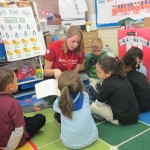It’s one thing to learn a skill in a class. It’s another to practice it in the real world, where conceptual lines are blurrier than they are in textbooks. It’s a distinction that leads many professional training programs to feature internships, which some may call clinical experiences of practicums, to complement the skills students learn in class. It is one that led the University of Connecticut’s Administrator Preparation Program (UCAPP) to reexamine internships when it began revamping its offerings to strengthen principal training.
Violet Jiménez Sims, a faculty member in the Neag School and New Britain Schools board of education member, comments on the board’s vow of inclusion in response to George Floyd’s death.
”We need to get ahead of this crisis to survive and thrive together. It is time to provide alternate options in education preparation so we can continue to prepare high-quality leaders and teachers within this ‘new normal,‘” says Patricia Virella.
“As we piece together what the new normal might look like in our high schools, we should take advantage of this disruption to reconfigure the many moving parts that have been used as excuses for maintaining the status quo,” says Michele Back, an assistant professor of secondary and world languages education in UConn’s Neag School of Education.
“We need to get ahead of this crisis to survive and thrive together. It is time to provide alternate options in education preparation so we can continue to prepare high-quality leaders and teachers within this ‘new normal,'” says Patricia Virella, a Ph.D. student at the Neag School and faculty member at Sarah Lawrence College’s Art of Teaching Program.
Students need to feel safe and have supportive relationships for their social, emotional, and academic learning to be optimized. Students experiencing trauma, such as from public health crises, weather disasters, or other upsetting events, may have been exposed to unpredictable schedules, inconsistent supervision, or food insecurity and desperately need school to be their safest, most predictable, and most positive setting, especially if they have been displaced or are without utilities or basic comforts.
The University of Connecticut’s Administrator Preparation Program (UCAPP) aims to be a leading leadership program—with a curriculum that guides its students through rigorous, relevant learning experiences so they are prepared to serve as leaders and champions of equity on their first day on the job.
In this post, Dr. Richard Gonzales, director of the university’s educational leadership preparation programs, describes why the university decided to participate in the initiative, its general approach to the work, and the effects it is seeing so far. Other posts include descriptions of efforts to redesign curricula and internships, students’ and faculty members’ views about the new design, and the ways in which the university works with community partners to ensure it is meeting their needs.
“This graduation celebration is fitting because of the COVID-19 pandemic, as this is the way we started ScHOLA2RS House – a lot of uncertainty, some anxiety, fear of the unknown. Yet many of us were courageous to face this uncertainty, as we knew a blessing would come on the other side. That blessing has manifested today, the first ScHOLA2Rs House freshman cohort to graduate,” said Erik Hines, the first faculty director and former Neag School professor.
With school closures announced across the country, Neag School faculty, alumni, and students share resources and expertise on teaching, learning, homeschooling, and parenting during the pandemic.


